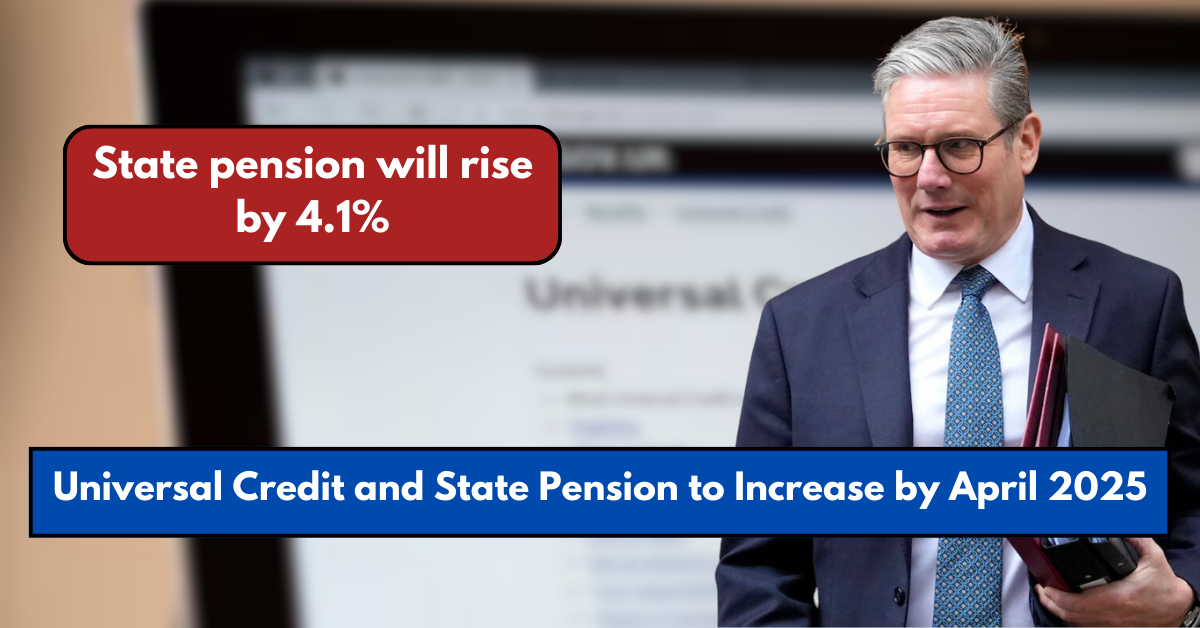Millions of people in the UK who receive government benefits will see a welcome increase in their payments starting April 2025. These updates aim to help families and individuals cope with rising living costs.
The Department for Work and Pensions (DWP) has confirmed that various components of Universal Credit, along with other benefits, will increase in line with inflation. Let’s break down what this means for claimants and how these changes will affect households across the country.
Universal Credit Will Replace Tax Credits
One of the biggest changes happening in April 2025 is the full replacement of Tax Credits with Universal Credit. This is part of the government’s plan to simplify the benefits system and make it easier to manage.
Families currently receiving Tax Credits will need to transition to Universal Credit by April 5, 2025. However, this switch isn’t automatic. Once notified by the DWP, claimants must take action and apply for Universal Credit. Many families have already started this process, but those still receiving Tax Credits should apply as soon as they get the migration notice.
Source: My London News
Universal Credit Payments Will Increase
Starting in April, the Standard Allowance for Universal Credit will increase by 1.7%, reflecting the inflation rate measured in September 2024. This allowance is the base payment for all Universal Credit claimants, meant to help with basic living expenses.
Here’s how the new rates will look:
- Single claimants under 25: Monthly payment will rise from £311.68 to £316.98.
- Single claimants over 25: Monthly payment will increase from £393.45 to £400.14.
- Joint claimants under 25: Monthly payment will rise from £489.23 to £497.55.
- Joint claimants over 25: Monthly payment will go from £617.60 to £628.10.
This increase provides much-needed relief for families and individuals with the lowest incomes.
Extra Payment Rates for Children and Disabilities
Families with children and individuals with special needs will also benefit from higher payment rates. The child element, which provides extra financial support for families, will increase as follows:
- For the first child born before April 6, 2017, the payment will rise from £333.33 to £339 per month.
- For children born after this date or for additional children, the payment will go up from £287.92 to £292.81 per month.
Extra payments for children with disabilities will also see increases:
- Lower disability rate: From £156.11 to £158.76 per month.
- Higher disability rate: From £487.58 to £495.87 per month.
These increases are part of the government’s commitment to providing additional support to families with unique challenges.
State Pension to Rise by 4.1%
Another important update is the increase in the state pension, which will rise by 4.1% under the triple lock guarantee. This system ensures the state pension increases by the highest of 2.5%, average wage growth, or inflation.
This rise means pensioners will receive higher payments, helping them keep up with the cost of living. Other benefits like Disability Living Allowance and Child Benefits will also increase, providing extra support for vulnerable groups.
Why Are These Changes Happening?
The increases in Universal Credit and other benefits are tied to the inflation rate, which was 1.7% in September 2024. This is a standard practice in the UK, where benefits are adjusted annually to reflect rising living costs.
As of now, around 19.7 million households in the UK receive at least one benefit from the DWP or HMRC. These updates will ensure that millions of families have more financial security during challenging times.
Source: Chronicle Live
How to Prepare for These Changes
If you’re currently receiving Tax Credits, it’s crucial to watch for communication from the DWP. Once you receive a migration notice, take immediate steps to apply for Universal Credit to avoid interruptions in your payments.
For those already receiving Universal Credit, the increases will automatically be applied starting April 2025. You don’t need to take any additional steps, but it’s a good idea to review your benefits statement to understand how the changes will impact your payments.
Conclusion
The upcoming changes to Universal Credit and other benefits in April 2025 are designed to provide extra support to families, individuals, and pensioners across the UK. From higher Standard Allowances to increased payments for children and disabilities, these updates aim to address rising living costs and ensure financial stability for millions.
If you’re affected by these changes, stay informed and take action when required to make the most of the updated benefits system.
This article has been carefully fact-checked by our editorial team to ensure accuracy and eliminate any misleading information. We are committed to maintaining the highest standards of integrity in our content.
Filza specializes in simplifying financial topics for everyday readers. Whether breaking down Canada’s tax guides or U.S. benefits like SNAP and VA Disability, Filza’s relatable writing style ensures readers feel confident and informed. Follow her insights on LinkedIn or reach out via email at shewrites.health@gmail.com.
